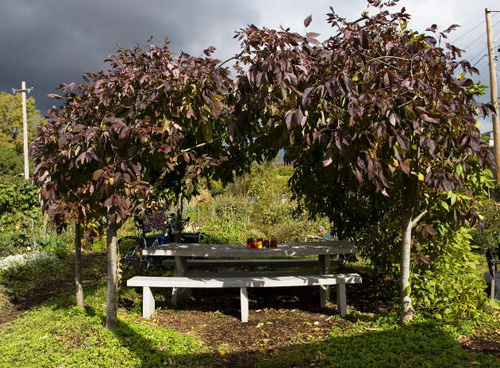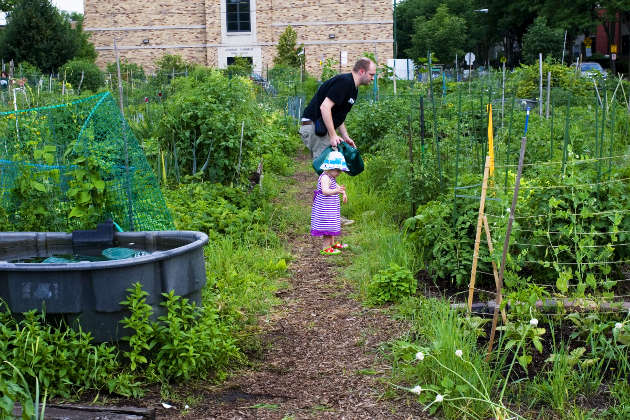
For the last few weeks, I have been talking withgardeners at an imperiled community garden on the South Side ofChicago. My colleagues at the Invisible Institute andI are making a "live documentary" about the garden, daily posting shortconversations with gardeners, speaking out of their 10' x 10' plots, while wework on a full-length narrative. (You can taste our work at the end of this post.) At thispoint, we don't yet know how the story ends.
Located at 61st Street and Dorchester Avenue, the gardenis on land owned by the University of Chicago.Since 2000, the U of C has allowed the gardeners -- I am among them -- to usethe site. Last spring, it informed us itwants its land back. The University has no immediateplans to build on the site, but rather intends to use it temporarilyas a staging area for the construction of a building at the other endof the block. It has set Oct. 30 as the deadline for the gardenersto vacate the land they have cultivated.
Over the past six months, various efforts havebeen made to engage the U of C in conversation about possiblepractical alternatives that would preserve the garden until the timecomes to build on it. (That process began with this essay.) While we have had some fruitful, informalconversations with individual administrators, the institution'sposition has remained unchanged: It's our land. We want it back. Youalways knew your use of it wasprovisional.
All true. Yet isthis, under the circumstances, a sufficient response? While notcontesting the University's right to dowith its property what it wishes, community members have questionedwhether the University, in assessing its own interests, is properlyvaluing the garden.
This line of argument has, I know, beenintensely frustrating to some U of C administrators. They feel theyhave been generous andaccommodating in allowing the gardeners to use the land for nine yearsand in offering to help "relocate" the garden. Their patience has beentried by what they see as endlesssecond-guessing of their sovereign administrative decisions.
There is also frustration among those seekingto speak for the garden. It arises not only from the University'srefusal to engage at the level of practical problem solving but alsofrom our inability to adequately evoke the value of the garden. Wehave struggled to give voice to that whichis at once precious and un-relocatable.
If the garden is destroyed, some individualgardeners andgroups of gardeners will establish gardens elsewhere. That is atestament to human adaptability:life goes on. It does not testify to thewisdom of the U of C's approach.
The University's argument for relocation gives us toomuch credit. It assumes that we know howto do this, that we have a recipe for creating a wonderful garden. Butthe power of the 61st Street garden tonourish and console, to delight and instruct is more mysterious thanthat. It is the product of countless acts ofattention and care by many people over time -- an organic process of immensecomplexity shaped by chance, serendipity, and grace as well as design.
Our documentary project, The GardenConversations, growsout of this realization. It is animatedby the hope that a diversity of voices might articulate -- and embody -- what nosingle voice can fully express.
It would be disingenuous to pretend this project is notpart of the ongoing effort to persuade the University to reconsider itscourse. That is not, however, itsprimary purpose. The approachingdeadline imposed by the U of C -- coupled with the coldest, wettest, swiftestautumn in memory -- has created an urgency to understand.We are pressed to find words for dimensionsof experience we would continue to take for granted, were they not imminentlythreatened.

So what have we learned thus far from our conversationsin the garden? A number of themes haveemerged, radiating outward from the intimate geography of individual plotstoward the great questions of health, ecological sanity and survival in ourtime.
One major theme, touched on in many of theconversations,centers on how gardeners come to know what they know. Virtuallyall those we have talked with, nomatter how skilled and experienced, describe themselves variously as"beginners," "amateurs" or "duffers."They recount how they learn things -- by observing other plots; by seekingthe advice of other gardeners; and, above all, by paying close attention towhat grows and what doesn't in their soil and light.
In different voices and idioms, they describe a mode oflearning that is intensely practical and close to the ground; a matter ofmaking oneself available to one's environment and interacting with itmindfully; a practice, as Wallace Stegner once said of Wendell Berry, ofsubjecting oneself to one's subject. Itis a dynamic that carries one deeper into the world, disclosing the trueconditions of life and offering the means to inhabit those realities.
These intellectual habits contrast sharply with the sortof power that shapes its environment to conform to what it already knows,seeking to define rather than discern the conditions of life around it, anddisregarding what it doesn't understand or control.

The University purports to be committed to somethingcalled "sustainability." This term has,with record speed, joined that select category of words -- "community" and "peace"come to mind -- rendered so elastic by abuse that they can be draped overantithetical agendas.
For example: the construction of a state-of-the-art,green, LEED-certified building that will do avoidable damage to a unique urbanecosystem is celebrated as an expression of the U of C's commitment tosustainability.
Listening to administrators try to dissolve thiscontradiction by repeating the University's offer to help "relocate" the 61stStreet garden, I am reminded of a remark Lech Walesa and Adam Michnik ofSolidarity each attribute to the other.Referring to the state of the Polish economy as the nation emerged fromCommunist rule, one or the other (or perhaps both) said, "It's easy to turn anaquarium into fish soup. It's moredifficult to turn fish soup back into an aquarium."
This lesson -- amply illustrated by the history of urbanrenewal on the South Side -- suggests the standard of carerequired. The garden is a livingthing. It cannot be relocated. The time will come to endit, but why now andfor such faint reasons, when there are workable, safe, and cost-effectivealternatives?
A friend with much experience working to advance"sustainability" within corporate and academic institutions once told me,endearingly, that she doesn't know what the word means. Thatstrikes me as a good place tostart. The question then becomes: whatsort of process will, over time, give concrete meaning to the term, whileguarding against intellectual corruption?
Perhaps we would do better to think of "sustainability"as a verb grounded in practical activity rather than a noun skewed towardabstraction. If we did, we would findourselves thinking less like social engineers and more like gardeners who learnthings by practicing close attention to place, humility before mysteries theydon't fully comprehend, and hope for renewed inquiry in the spring.